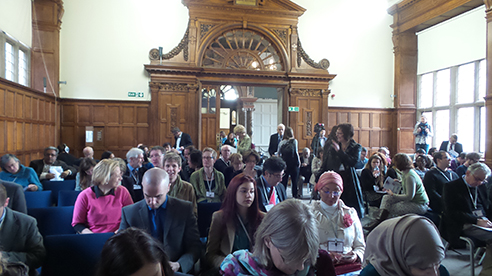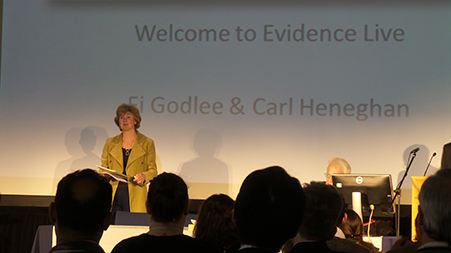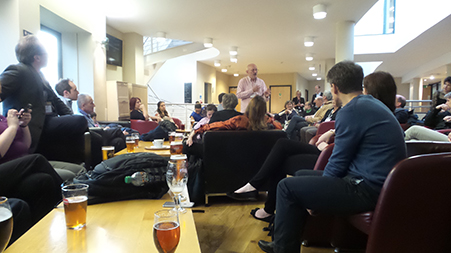Editorial
← vista completaPublished on April 23, 2015 | http://doi.org/10.5867/medwave.2015.03.6127
Evidence and the Latin American region - dialogue or diatribe?
La evidencia y la región - ¿conversan o colisionan?
When is it going to happen that the Latin American region understands that decision-making, regarding both clinical practice and health policy, must be based on good-quality evidence not taken from other latitudes? It seems difficult to envision that this may happen sometime in the near future and there are many reasons that help explain why we are lagging behind. On the one hand, the methods to generate evidence and the ways in which they are applied are rapidly evolving. On the other hand, we sorely lack local capacities to produce research and analysis.
I am writing from Oxford, Great Britain (or should I say England?) after having attended a brilliant meeting called Evidence Live 2015. It was two days of debate, oral presentations, heated discussions, advocacy on a variety of issues, training and workshops, collective reflection, and few conclusions but a lot of work to take home. I will begin by taking on my own responsibility by writing this editorial in order to convey to our Latin American and Spanish community what I find may be relevant to our needs, or what we might do to contribute within the broader context. I will attempt a chronological narrative of some of the topics that were covered, and I will conclude mentioning some of the challenges that we might undertake.


The first day we listened to Richard Peto refer to systematic reviews on statins. He holds a different position from the one that The BMJ has advocated through its “Statins - a call for transparent data” campaign. Peto is codirector of Cholesterol Treatment Trialists’ and since the mid-nineties, they have been carrying out independent studies on this topic. In his talk, Peto claimed that there is one case of myopathy from statins for every 1000 treated persons. He also critiqued the methodology of evaluating heterogeneity of the studies included for meta-analysis called the random-effects model, which, according to him, assigns equal weight to all of the included studies, regardless of the number of patients that each study has. Peto was probably fully aware that this was a simplification, because the model does consider weighing for the size of the studies in the meta-analysis, but it does so with a smaller gradient than in fixed-effects models [1]. The point he wanted to establish was that the real favorable effect size is being underestimated in the meta-analyses that use the random-effects models. At the end of his presentation he was asked about the run-in period, which is when patients who are randomly selected to participate in the study are followed for a period of time to see if they actually adhere to treatment (either active treatment or placebo, randomly allocated), in which case they are then enrolled for the long-term study. It was pointed out that many participants who stop taking their medication in the run-in period may do so because of collateral effects, such as muscle weakness, pain or fatigue (known adverse effects from statins), which could result in an under-estimation of the harms effect of treatment during the trial proper. However, this consideration was not actually responded by Peto during the discussion, and the ball was left rolling.

This is stuff for the initiated in applied statistics in therapy trials and in advanced methods of meta-analysis, so it is worthwhile to mention that there was also a session called “The Great Statins Debate”, centered on the use of statins in people at low risk of heart disease. Here the focus was how good is the evidence base and what can be done to fix it. Due to a likely “selection bias” of the attendees to Evidence Live 2015, most of the presenters where against the use of statins in this group of patients, and only one was in favor. To reach a conclusion on the harms or benefits of primary prevention with statins, the attendees spoke out clearly on the need of accessing individual patient data of all clinical trials done up to now, data which is not available. Considering the widespread prevalence of statins use and that their cost has dropped due to patent expiry, it is of the essence to know the full safety profile of the class based on full and unbiased data; there were no two opinions on this issue. As a side benefit of this session, it was agreed upon that there is a need to review the evidence base for many other treatments that are being used on a global scale, since many of these treatments do not have good quality evidence to support their use. We all convened that the first task is to draw up a list of treatments being used for highly prevalent conditions and that would require access to individual patient data or new unbiased clinical trials.

So, after having provided a few brushstrokes of some of the issues at stake in the world of evidence-based medicine, what are we to do in the region? The first thing that all of the stakeholders should do is to strengthen the competencies of all health-care professionals in methodology, statistics and critical appraisal of the literature. It is of utmost importance that universities come of age in this matter; and faculty of health-related careers should have the appropriate methodological skills. Advance in this area will lead to undergraduate students being trained in evidence-based medicine right from the beginning. Only if we are able to do this will it be possible to count on a critical mass of people, including patients and organized civil society, with the necessary skills to understand and critically analyze the treatments they are giving or getting and the evidence base that supports it. If we move ahead in this direction – and the Pan-American Health Organization should play a greater stewardship role, together with the ministries of health of each country – we will be able to achieve at least two vital things:
- We will be able to produce more locally pertinent research of better quality. This way we will be freed from having to depend on research that is not generalizable to our context; and
- We will develop a healthy skepticism on what is presented to us from other latitudes, as well as keeping abreast with the rapidly changing methods of this non-paradigm called evidence-based medicine.
Fulfilling these two objectives will get us closer to achieving sustainable evidence-based health systems that may – we hope – reduce waste in health care and increase the value of what we do.
Notes
Interests
The author states that the journal she heads seeks to potentiate the knowledge of research methodology, critical appraisal of the results of biomedical literature, and transparency of research reports. She also declares that Medwave Capacitación Limitada, one of the companies that supports the publication of the Journal, has commercially offered in the past, and will continue to offer, training courses on methodology and statistics. The Journal adheres to the AllTrials campaign.
You can follow Vivienne on Twitter: @V_Bachelet.

